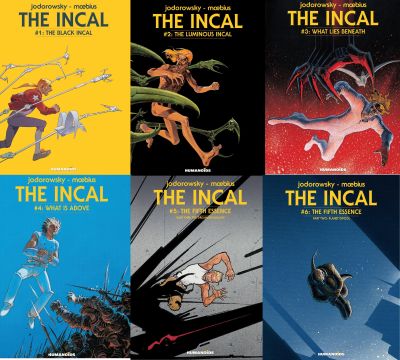Run, Boy, Run
The Incal
By Alejandro Jodorowsky & Moebius

28 Jul, 2020
0 comments
Alejandro Jodorowsky’s comic The Incal (French: L’Incal) was illustrated by Moebius (AKA Jean Giraud). The Incal was serialized in Métal hurlant from 1981 to 1988. The series comprises six volumes.
John DiFool is a low-budget private investigator, competent enough for only the most lowly of tasks. When the series opens, DiFool is being thrown by masked assassins to his certain doom in a deadly lake of acid far below.
As it happens the masked men want DiFool to answer some questions before his death. DiFool is snatched from death just before he hits the acid. Even better, the local robot police have noticed his predicament. One small nuclear detonation later and DiFool’s captors are dead, while DiFool is alive and surprisingly well for a man who just survived a nuclear explosion.
The aptly named DiFool has no desire to figure in earthshaking events. He prefers his ordinary routine of dealing with unsavoury clients and enjoying short encounters with sex robots. A chance encounter in a subterranean sewer, while fleeing from a commission gone sour, has left DiFool in possession of the Incal, an object of profound mystical power. Now inextricably entangled with its fate, DiFool is being pursued by factions eager to seize the Incal.
Chief among his many, many problems: the technocratic Church of Industrial Saints has a grand scheme to liberate the galaxy from the tyranny of light. The Church AKA Techno-Technos possesses the Dark Incal, which they use to produce Black Eggs. Each Dark Egg can consume an entire sun. Soon, the sky will be innocent of light, freeing humanity to enjoy blessed dark.
In a better world, the government would intervene to prevent mass stellarcide. In John DiFool’s world, the government is comprehensively compromised; most of its members are either utterly corrupt, subject to blackmail, or unable to act effectively. The fate of the human realm is therefore in the hands of one craven, debauched detective and his pet bird.
~oOo~
I am reviewing this because I bought a stack of French comics on the cheap.
Readers may wonder how snuffing out all the stars within reach1 could possibly make life better. The Techno-Technos are so convinced that it will that they never feel the need to make a case for their grand project. I would like to denounce this as too absurd even for French comic book science fiction (which likes spectacle and bare breasts a lot more than it does verisimilitude), but it’s 2020 now and “this is beyond the realm of plausibility” is no longer a playable move.
The Incalis, if I understand events correctly, a by-product of Alejandro Jodorowsky’s spectacularly doomed attempt to adapt Frank Herbert’s Dune to film. For more details, see here. No movie, but we got a six volume graphic novel series, just as many volumes as the Dune series.
One could almost think it a pity the film never got made, as its history suggests that it would have been a magnificent catastrophe of the sort that ends careers and levels entire production houses. At least Jodorowsky managed to repurpose some of his work2.
The Incal is that most dreaded of narratives, the sort in which eventual victory requires personal growth. DiFool does not want to be a better person. He wants to be a seedy lowlife, live in his own squalid room, and cavort with an ample supply of robot hookers. Fate dictates otherwise. Much the same is true of his allies, most of whom are forced to evolve in ways they might have preferred not to.
Readers looking for hard science fiction should look elsewhere. Jodorowsky’s imagined future is an impressionistic and dreamlike space opera, mixing science fiction with occult elements in unpredictable ways. Trying to retcon this into unified, sensible whole would seem to miss the point.
Moebius’ art contributes as much to the impact of these comics as does Jodorowsky’s vision. The art is detailed and exact; its precision ably compliments the tale Jodorowsky wants to tell.
The Incal is available as part of this bundle.
1: That would be approximately 22,000 stars. Since this would leave about four hundred billion stars untouched in the Milky Way, it would have no discernable effect on the night sky (even ignoring light speed effects). It may be that Jodorowsky wasn’t trying to write hard science fiction. Or that he had no idea just how large a galaxy is.
2: The Incal lifts at least one plot development directly from Dune: a high-ranking functionary who is supposed to be invulnerable to all attempts to suborn him folds immediately as soon as someone thinks to threaten a relative. In Dune, that [spoiler] could be corrupted comes as a tremendous surprise. In The Incal, it’s probably just what one would expect in this setting, where almost nothing works correctly.
